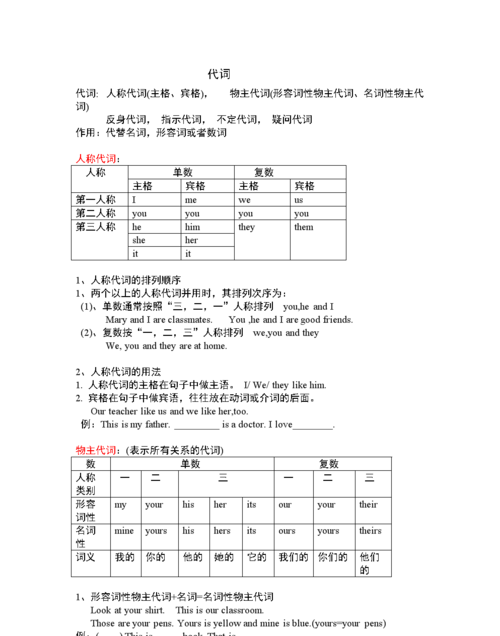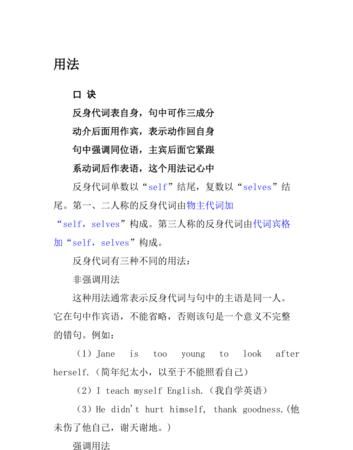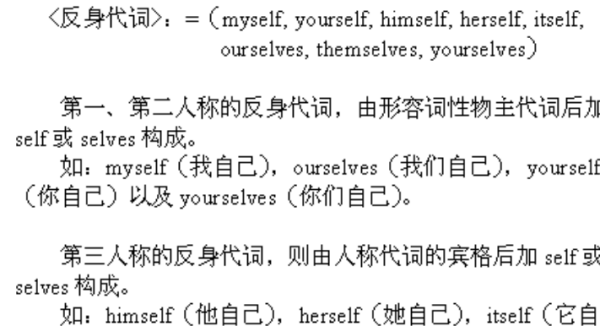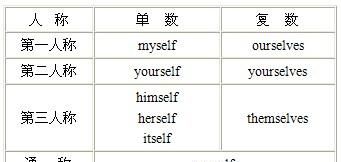本文目录
反身代词的用法
反身代词的用法
反身代词是代词的一种u,以下是我整理的反身代词的用法,欢迎参考阅读!
一、非强调用法
这种用法通常表示反身代词与句中的`主语是同一人。它在句中作宾语,不能省略,否则该句是一个意义不完整的错句。例如:
(1)Jane is too young to look after herself.(简年纪太小,以至于不能照看自己)
(2)I teach myself English.(我自学英语)
(3)He didn't hurt himself, thank goodness.(他未伤了他自己,谢天谢地。)
二、强调用法
反身代词在强调用法中表示强调,即用来加强某个名词或者代词的语气,可译成“亲自”、“本人”。此时,它在句中作同位语。即使去掉,也不影响句子的完整性。例如:
(1)You must do it yourself.(你必须自己做)
(2)I myself did the homework last night。(昨晚是我自己做了家庭作业)
三、与by搭配
当反身代词与by搭配时,意为:单独地,没有人帮助的。例如:
(1)We must finish it all by ourselves.(我们必须全靠自己去完成。)
(2)He can swim all by himself.(他能独自一个人游泳。)
;
反身代词的三种用法造句
反身代词以-self(单数)或-selves(复数)结尾。
第一、二人称的反身代词由物主代词加-self构成。
第三人称的反身代词由代词宾格加-self构成。反身代词有三种不同的用法:
一、非强调用法
这种用法通常表示反身代词与句中的主语是同一人。它在句中作宾语,不能省略,否则该句是一个意义不完整的错句。例如:
(1)Jane is too young to look after herself.(简年纪太小,以至于不能照看自己)
(2)I teach myself English.(我自学英语)
(3)He didn't hurt himself, thank goodness.(他未伤了他自己,谢天谢地。)
二、强调用法
反身代词在强调用法中表示强调,即用来加强某个名词或者代词的语气,可译成“亲自”、“本人”。此时,它在句中作同位语。即使去掉,也不影响句子的完整性。例如:
(1)You must do it yourself.(你必须自己做)
(2)I myself did the homework last night。(昨晚是我自己做了家庭作业)
三、与by搭配
当反身代词与by搭配时,意为:单独地,没有人帮助的。例如:
(1)We must finish it all by ourselves.(我们必须全靠自己去完成。)
(2)He can swim all by himself.(他能独自一个人游泳。)
反身代词的三种用法【 春喜外语 】供稿!春喜外语,学英语告别复读模式,与 真人外教一对一 面对面交谈,不管帅哥还是美女都任你选择。 在线英语培训 ,只要有网络就可以轻松进入学习状态,老师、上课时间、地点你说了算。5年时间12000名学员的共同选择,欲了解更多详情,欢迎咨询在线客服!
此文章首发于 春喜外语 官网

反身代词的用法
用法
一、反身代词的基本形式
反身代词是 oneself根据所指词的人称、性别、单复数等的变化可以有 myself, himself, herself, yourself, itself, ourselves, yourselves, themselves 等形式。
二、oneself与himself
当one指人时,其相应的反身代词通常用oneself, 在美国英语中也可用himself:
One should not praise oneself [himself]. 一个人不应该自吹自擂。
三、反身代词的句法功能:
1. 用作同位语(加强被修饰词的语气,仅放在被修饰名词后, 或句末):
The box itself is not so heavy. 箱子本身并不重。
Mrs.Black herself is a lawyer. 布莱克太太本人就是一名律师。
You had better ask the driver himself. 你最好问司机本人。
Martin himself attended the sick man. 马丁亲自照顾病人。
Don’t trouble to come over yourself. 你不必费神亲自来了。
You yourself said so. / You said so yourself. 你自己是这样说的。
Never leave to others what you ought to do yourself. 不要把自己该做的事留给别人做。

2. 用作宾语(动词或介词的宾语):
Take good care of yourself. 好好照顾你自己。
He has a right to decide for himself. 他有权为自己做出决定。
He made no complaint for himself. 他没为自己抱怨什么。
The child can dress himself. 这孩子能自己穿衣服了。
She finally gained control of herself. 最后她控制住了自己。
She could not make herself understood. 她不能使别人听懂她的话。
Everybody here has the influenza including myself. 包括我在内所有人都患上流感。
The child cried himself to sleep. 孩子哭着哭着睡着了。
She convinced herself that it was so. 她说服自己情况是这样的。
He had a couple of revolvers with which to defend himself. 他只有一两把手枪用来自卫。
3. 用作表语
The poor boy was myself. 那个可怜的孩子就是我自己。
Just be yourself. 做你自己就好了。
Mary hasn't quite been herself recently. 玛丽近来感到不适。
The ones who really want it are ourselves. 真正想要它的是我们自己。
【说明】有时用于 be, feel, seem, look 等后作表语表示身体或精神处于正常状态:
I’m not quite myself these days. 我近来身体不大舒服。
I’ll be myself again in no time. 我过一会儿就会好的。
4. 用作主语。在现代英语中,反身代词一般不能独立用作主语,但是它却可以借助 and, or, nor 等连词与其他名词一起构成并列主语(且位于并列主语的后部),以及用于某些特殊结构(如as...as等):
My brother and myself went there yesterday. 昨天我兄弟和我一起去了那儿。
Jim’s sister and himself get up at six every day. 吉姆的妹妹和他每天6点起床。
He was as anxious as myself. 他和我一样担心。
反身代词的用法
反身代词
反身代词是一种表示反射或强调的代词.它的基本含义是:通过反身代词指代主语,使施动者把动作在形式上反射到施动者自己.因此,反身代词与它所指代的名词或代词形成互指关系,在人称、性、数上保持一致.
如:
(1)A marked bee fed itself from the dish and returned to the hive.
一只做了标记的蜜蜂从盘中喂饱自己以后就飞回蜂箱了(itself 与 bee 在人称、性、数上保持一致)
(2)In 1955 Walt Disney himself opened the first Disney park.
1955年,沃尔特.迪斯尼亲自创办了第一个迪斯尼公园.(himself 与 Walt Disney 在人称、性、数上保持一致)
反身代词和人称代词作宾语时具有不同的含义.
如:
(3)He saw himself in the mirror.
他在镜子里看见了他自己.(himself 和 he 为同一人)
(4)He saw him in the mirror.
他在镜子里看见了他.(him 显然指另外一人)
常见的反身代词列表:
I--myself you-- yourself your-- yourselves she--herself he
himself
we they it one
ourselves themselves itself oneself
用法
1)做宾语
a. 有些动词需有反身代词
absent, bath, amuse, blame, dry, cut, enjoy, hurt, introduce, behave
We enjoyed ourselves very much last night. 我们昨晚玩得很开心.
Please help yourself to some fish. 请你随便吃点鱼.
b. 用于及物动词+宾语+介词
take pride in, be annoyed with, help oneself to sth.
I could not dress (myself) up at that time. 那个时候我不能打扮我自己.
注:有些动词后不跟反身代词, get up, sit-down, stand up, wake up等.
Please sit down. 请坐.
2) 作表语; 同位语
be oneself: I am not myself today. 我今天不舒服.
The thing itself is not important. 事情本身并不重要.
3) 在不强调的情况下,but, except, for 等介词后宾语用反身代词或人称代词宾格均可.如:
No one but myself (me) is hurt.
a. 反身代词本身不能单独作主语.
(错) Myself drove the car.
(对) I myself drove the car. 我自己开车.
b. 但在and, or, nor连接的并列主语中,第二个主语可用反身代词,特别是myself 作主语.
Charles and myself saw it.
5)第二人称作宾语,要用反身代词.
You should be proud of yourself. 你应为自己感到骄傲.
myself-第一人称单数,我自己
ourselves-第一人称复数,我们自己
yourself-第二人称单数,你自己
yourselves-第二人称复数,你们自己
himself/herself/itself-第三人称单数,他/她/它自己
1) 列表
数 单数 复数
人称 第一人称 第二人称 第三人称 第一 人称 第二人称 第三人称
人称代词 I you he/she/it we you they
反身代词 myself yourself yourself/herself/himself ourselves yourselves themselves
另外:one的反身代词为oneself
2)做宾语
a. 有些动词需有反身代词,如absent, bathe, amuse, blame, dry, cut, enjoy, hurt, introduce, behave等.例如:
We enjoyed ourselves very much last night. 我们昨晚玩得很开心.
Please help yourself to some fish. 请你随便吃点鱼.
b. 用于及物动词+宾语+介词,如take pride in, be annoyed with, help oneself to sth等.例如:
I could not dress(myself)up at that time. 那个时候我不能打扮我自己.
注:有些动词后不跟反身代词,如:get up, sit-down, stand up, wake up等.例如:
Please sit down. 请坐.
3) 用作表语,如结构be oneself.例如:
I am not myself today. 我今天不舒服.
4) 用作同位语
The thing itself is not important. 事情本身并不重要.
5) 在不强调的情况下,but, except, for 等介词后宾语用反身代词或人称代词宾格均可.如:No one but myself(me)is hurt.
注意:
a. 反身代词本身不能单独作主语.
(错) Myself drove the car.
(对) I myself drove the car. 我自己开车.
b. 但在and, or, nor连接的并列主语中,第二个主语可用反身代词,特别是myself 作主语.例如:
Charles and myself saw it. 查尔斯和我看见了这件事.
D.反身代词
定义 人称代词的宾格或所有格词尾加“-self,-selves”的代词称为反身代词(Reflexive Pronoun),亦称复合人称代词(Compound Personal Pronoun).
反身代词的用法
(1)反身用法:及物动词的宾语即为主语本身的用法叫作反身用法.
例A:The old man killed himself last night.
(那个老人昨夜自杀了.)
例B:We enjoyed ourselves very much at the party last night.
(昨夜我们在宴会中过得很愉快.)
例C:Help yourselves,please.
(请各位不要客气.)
解说 如各例句所示,各反身代词都是指其主语本身.这种用法有些已成为惯用表达法(例B),例如:
例:He absented himself from school this morning.
(他今天早晨缺席,没有到学校.)
例:She seated herself by the window.
(她拣了窗边的一个座位坐下来.)
例:I was late this morning because I overslept myself.
(今天早晨我迟到是因为我睡过头了.)
例:Don't overeat yourself,or you'll get sick.
(不要暴食,否则你会生病的)
例:They dressed themselves up quickly and left the house.
(他们匆匆地穿好衣服后就出去了.)
(2)作介词的宾语用:也是属于反身用法.
例A:The door opened of itself.
(门自动地开了.)
例B:I like to travel by myself.
(我喜欢独自旅行.)
例C:She was beside herself with grief.
(她悲伤过度,神经失常了.)
解说 例A的“of itself”是表示无外力干予,即“自动”的意思.例B的“by myself”是表示无外人参加,即“独自”的意思.例C的“beside herself”是表示脱离她本来的自我,即“失常,发疯”的意思.
(3)表达强调
例:I myself heard him say so yesterday.
(我昨天亲自听他这么说的.)
例:she did it herself.(=She herself did it.)
(她自己做的.)
例:The story itself is not interesting.
(故事本身并不令人感到有趣

以上就是关于反身代词用法汇总 ,反身代词的用法的全部内容,以及反身代词用法汇总 的相关内容,希望能够帮到您。

